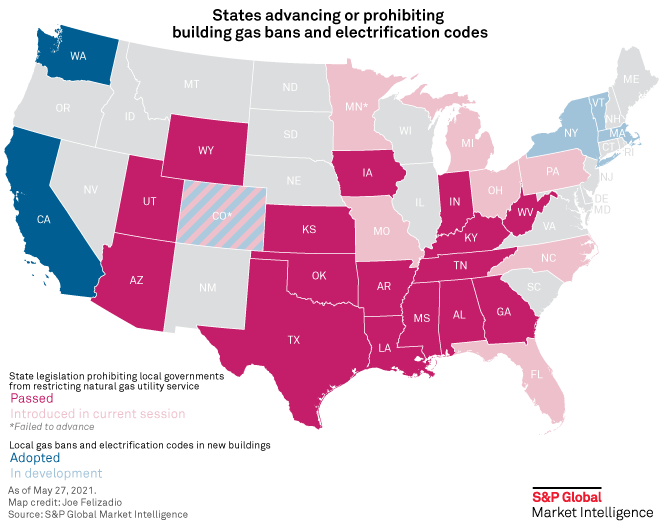Featured Topics
Featured Products
Events
S&P Global Offerings
Featured Topics
Featured Products
Events
S&P Global Offerings
Featured Topics
Featured Products
Events
S&P Global Offerings
Featured Topics
Featured Products
Events
Financial and Market intelligence
Fundamental & Alternative Datasets
Government & Defense
Professional Services
Banking & Capital Markets
Economy & Finance
Energy Transition & Sustainability
Technology & Innovation
Podcasts & Newsletters
Financial and Market intelligence
Fundamental & Alternative Datasets
Government & Defense
Professional Services
Banking & Capital Markets
Economy & Finance
Energy Transition & Sustainability
Technology & Innovation
Podcasts & Newsletters
22 Jun, 2021
Colorado will require investor-owned electric utilities to incentivize building electrification, marking a new strategy to reduce the building sector's reliance on natural gas and other fossil fuels for heating and cooking.
Colorado Gov. Jared Polis signed the legislation, SB21-246, into law on June 21, setting in motion a process that will see the Colorado Public Utilities Commission implement a beneficial electrification program. Under that program, investor-owned electric utility operators Xcel Energy Inc. and Black Hills Corp. will have to develop plans to displace fossil fuel-powered appliances and heating systems in favor of high-efficiency electric alternatives, like heat pumps and induction stoves.
The utilities will not only be able to recover the cost of operating the programs, but they will qualify for incentives by exceeding any electrification or emissions reduction targets that regulators establish. The law authorizes the companies to offer incentives to their electric customers, even if another utility distributes gas to the customer.
Xcel and Black Hills both provide electric and gas distribution services in Colorado. Atmos Energy Corp. distributes gas to about 120,000 Coloradans, while Colorado Natural Gas Inc. serves roughly 22,600 Centennial State customers.
Colorado takes new approach
The legislation is a part of the Polis administration's efforts to reduce statewide carbon emissions from 2005 levels 26% by 2025, 50% by 2030 and 90% by 2050, as required by legislation passed in 2019. Since taking full power of the legislature and governor's office in 2019, Democrats passed a series of sweeping bills — which faced intense pushback from the oil and gas lobby — that empower regulators to enforce such climate goals.
Polis signed the act into law as Denver joins a host of cities considering or implementing building electrification mandates. The state legislature considered legislation to prohibit local building gas bans, but the bill died in committee, in contrast to swift passage of the policy throughout the Central and Southern U.S. Polis also worked out a ceasefire between environmentalists and the gas industry, averting a potential ballot initiative on prohibiting gas bans.

The act reflects Colorado's middle-of-the-road approach to electrification. It prohibits the PUC from banning new gas hookups or requiring Coloradans to replace gas-fueled appliances and equipment from existing buildings. However, it clearly states Democrats' preference to electrify building load. The bill passed with virtually no Republican support.
"Fossil gas and petroleum products will contribute to supplying Colorado's energy needs for many years to come; nonetheless, transitioning to clean electric homes and businesses is a critical strategy for improving public health and safety, saving energy, creating family-sustaining jobs and helping the state meet its greenhouse gas emission-reduction targets," the act's legislative declaration stated.
The act's supporters also undercut the gas industry's playbook for countering electrification mandates by drumming up support from unions. The bill includes provisions that direct participating customers to a list of approved contractors who abide by certain labor standards. A coalition of unions and environmental groups, including the Natural Resources Defense Council and Sierra Club, operating under the banner of the BlueGreen Alliance, backed the act.
Colorado targets 'beneficial electrification'
The act defines beneficial electrification as "converting the energy source of a customer's end use from a nonelectric fuel source to a high-efficiency electric source or avoiding the use of nonelectric fuel sources in new construction or industrial applications." Under the definition, conversion or all-electric construction is intended to cut emissions over the building system's lifetime, reduce societal costs and more efficiently utilize grid resources.
Investor-owned electric utilities will have to file a beneficial electrification plan at least every three years beginning on July 1, 2022. The plans must include programs to electrify residential and commercial customers, but the PUC will not require utilities to include programs for customers in the industrial sector where electrification is widely considered more challenging. The programs must target both new and existing building markets.
In a nod to climate justice and equity, at least 20% of the funding in the plans must be earmarked for low-income households or disproportionately impacted communities. Utilities must have an outreach plan to develop programs for those customer groups.
The cost-benefit analysis for the plans must include the social cost of carbon dioxide and methane emissions from fossil fuel combustion in appliances or industrial equipment slated for replacement. Utilities must also incorporate avoided emissions from natural gas production and delivery but also account for the CO2 emissions from electricity generation and the added load caused by electrification.
Utilities will have to demonstrate that they will serve the increased electric load that results from their program — "to the greatest extent practicable" — with power generation that has a carbon intensity equal to or less than the average carbon intensity of all generation in their portfolio. They must also provide documents and data that illustrate the plan aligns with the goal of maintaining grid reliability.